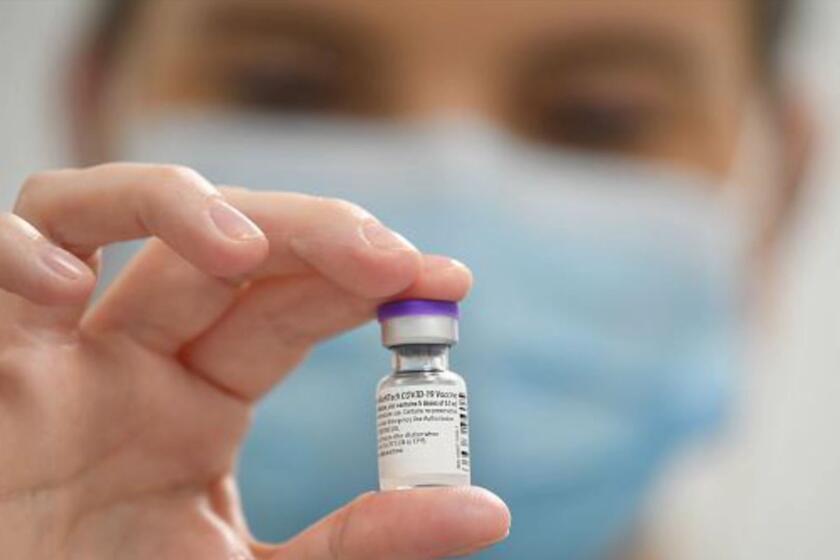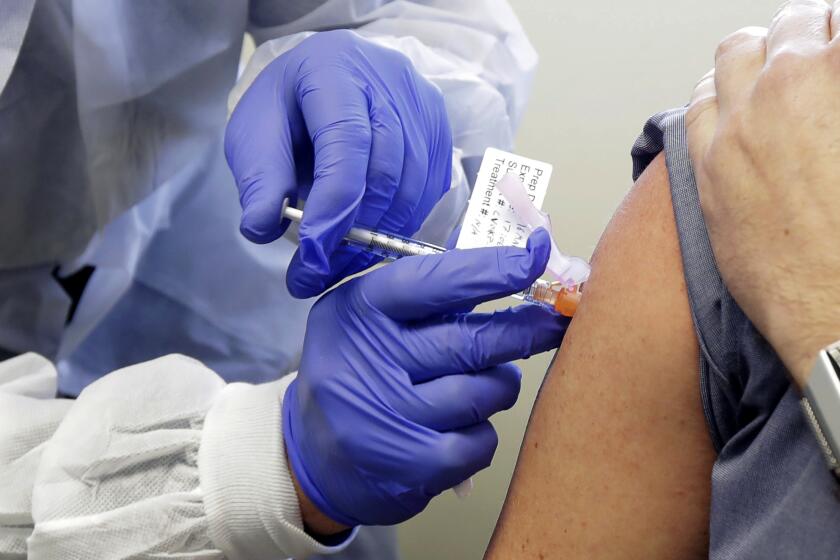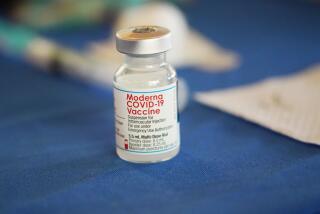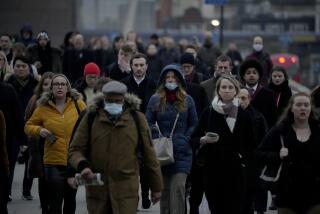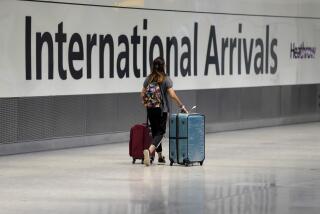Will ‘vaccine nationalism’ rear its head? Britain may be a test case
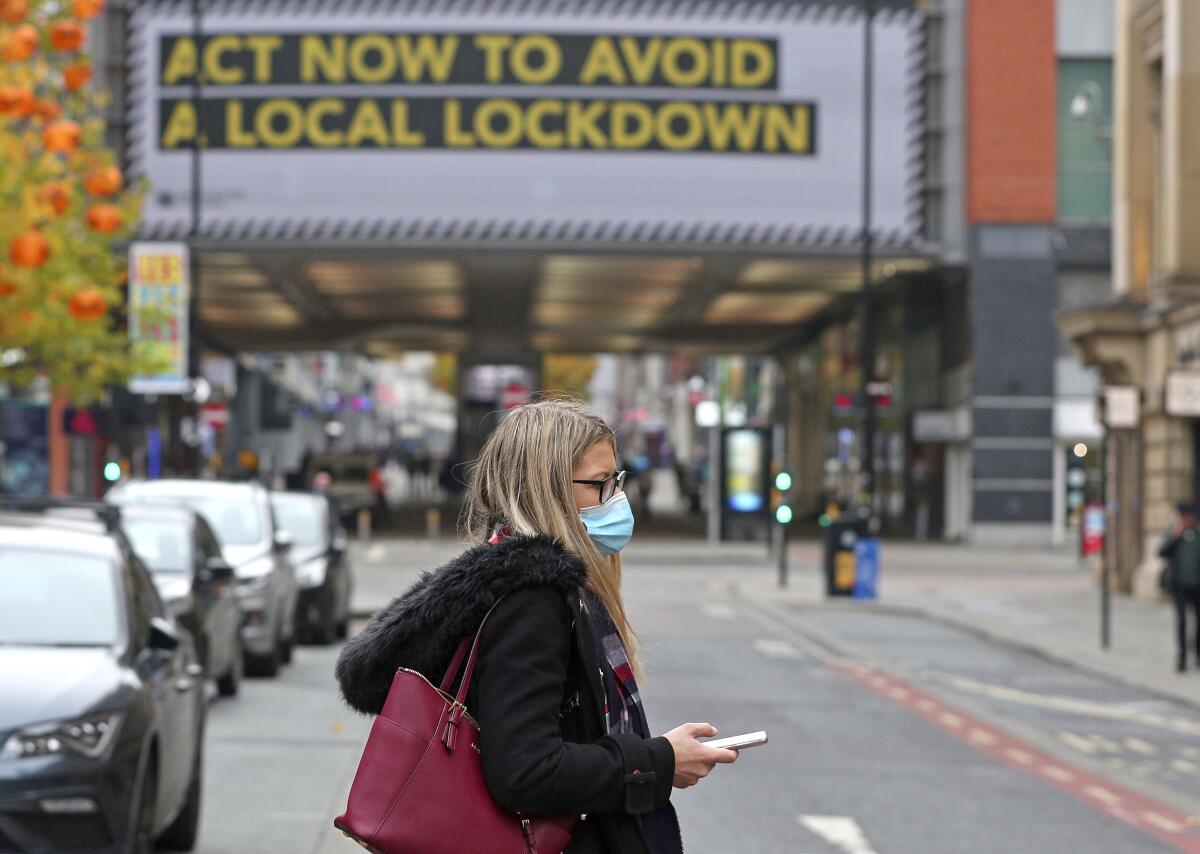
- Share via
For months now, public health experts have fretted about the phenomenon of “vaccine nationalism” — countries loudly touting their own efforts to fight the COVID-19 pandemic, sometimes at the expense of worldwide cooperation and coordination.
How does Britain’s first-in-the-world approval Wednesday of a stringently tested vaccine, with large-scale inoculations set to start next week, fit into that debate?
While it’s normal and expected for world leaders to prioritize their own countries’ interests, analysts say vaccine nationalism can become dangerous when public health decisions are driven by domestic political concerns, or when a prized commodity — inoculation against a deadly disease — is wielded as a geostrategic weapon.
“Vaccine nationalism will prolong the pandemic, not shorten it,” World Health Organization chief Tedros Adhanom Ghebreyesus said at a September briefing in Geneva as the race to develop and test a vaccine was still underway.
The Rand Corp. warned in a report this year that vaccine nationalism — including practices such as countries pushing for first access to a vaccine supply, or hoarding key components —could cost the global economy up to $1.2 trillion a year if they result in unequal allocation.
When people talk about COVID-19 vaccines, they can sound like they’re speaking a foreign language. Don’t worry! Here’s your guide to vaccine vocabulary.
Global deaths tied to COVID-19 neared 1.5 million and worldwide coronavirus infections numbered more than 64.3 million as of Wednesday, according to the Coronavirus Resource Center at Johns Hopkins University.
British regulators’ emergency approval of a vaccine developed by American pharmaceutical giant Pfizer and Germany’s BioNTech was hailed as a longed-for sign of hope in a country that has been hammered by COVID-19. Nearly 60,000 Britons have died, reflecting one of the highest per-capita death rates in Europe, and infections are approaching 1.7 million.
“Fantastic news,” Prime Minister Boris Johnson said of the regulatory approval, enthusing about the “biological jiujitsu” achieved by scientists. The 56-year-old prime minister, who endured a life-threatening bout of COVID-19 this year, has been harshly criticized for his handling of the coronavirus crisis.
British health officials said the country will begin receiving the first shipment of 800,000 doses from Belgium, where the vaccine is made, within days and that two-step mass inoculations will begin almost immediately. As is expected in the United States, priority will be given to healthcare workers and the most vulnerable, including nursing home residents.
But even with a speedy rollout, the United Kingdom, like the United States, is heading into a winter likely to be scarred by suffering. Because the caseload already is so enormous, the next few months are expected to bring many thousands more deaths, add to strains on an already overburdened health system and intensify economic hardship.
Although Britain’s opposition Labor Party chimed in with expressions of relief over the approval announcement, it drew a chilly response from the European Union. In an unusually curt statement, the bloc’s drug regulator, the Brussels-based European Medicines Agency — which is sifting through the same data that Britain used — suggested it was exercising appropriate diligence, and that Johnson’s government might have put speed ahead of safety in a bid to jump-start the process.
Britain is enmeshed in tense talks with the 27-member EU about its messy, drawn-out departure from the bloc, which was approved by national referendum in 2016. Brexit formally took place a year ago, but a yearlong transition period is barreling toward an end with deep divisions remaining.
Health Secretary Matt Hancock irritated European officials by suggesting that breaking with the EU had fostered a nimbler British approach on regulatory approval, resulting in Wednesday’s announcement. Another official, Business Secretary Alok Sharma, said the greenlighting of the vaccine marked “the day the U.K. led humanity’s charge against this disease.”
That was too much for Germany’s ambassador to Britain, Andreas Michaelis, who said the regulatory approval was not a “national story” of achievement. On Twitter, he questioned why it was “so difficult to recognize this important step forward as a great international effort and success.”
Coronavirus vaccines developed by Moderna and Pfizer show highly promising preliminary results in large-scale clinical testing. But key questions remain.
The British announcement comes as Johnson is maneuvering to find his footing with President-elect Joe Biden, after the prime minister forged what might be the closest friendship with President Trump by the leader of a major Western democracy. Biden has already signaled a sharp break with Trump on coronavirus policy, including plans to immediately reverse the president’s pullout from the WHO.
The Trump administration, seemingly unfazed over Britain being the first to approve a U.S.-pioneered vaccine, praised the move as a positive portent for the United States’ own vaccine approval and rollout, for which Trump is seeking to claim credit as his tenure in office draws to a close.
“For the American people, this should be very reassuring: An independent regulatory authority in another country has found this vaccine to be safe and effective for use,” Health and Human Services Secretary Alex Azar said in an interview on Fox Business.
In the United States, an emergency use authorization for the Pfizer-BioNTech vaccine by the Food and Drug Administration could follow a meeting on Dec. 10 of a panel of outside advisors, whose recommendation is often used as a guideline. But some experts say that even with an endorsement, the FDA approval could take weeks.
Up until now, no government had authorized a rigorously tested vaccine. Russia and China moved ahead with such authorizations despite lacking large-scale testing of their own vaccine’s effectiveness.
And Russian President Vladimir Putin this year put a decidedly nationalistic stamp on the rollout of a vaccine dubbed Sputnik V, invoking the name of the artificial satellite whose 1957 launch set off a space race with the United States.
Tens of thousands of Russians have already received the vaccine, and Putin said Wednesday that a new push would begin later this month targeting doctors and teachers.
Britain, with a population of 67 million, faces some daunting logistical challenges in hurrying ahead with its rollout. It will be dealing with new technology to store the vaccine at ultra-low temperatures, and the two doses must be administered 21 days apart.
Only about four dozen British hospitals will initially be authorized to administer the shots. Although the vaccine’s makers have reported no serious side effects, it is still not known whether asymptomatic people who have been inoculated can still spread the disease. And how long the protection lasts is not yet known.
Like Trump, Johnson may face a sizable contingent of compatriots who refuse to get a vaccine because they do not trust the government or public health experts. The British leader said he would “strongly urge” people to get vaccinated, but said it is “no part of our culture or our ambition in this country to make vaccines mandatory.”
More to Read
Sign up for Essential California
The most important California stories and recommendations in your inbox every morning.
You may occasionally receive promotional content from the Los Angeles Times.
